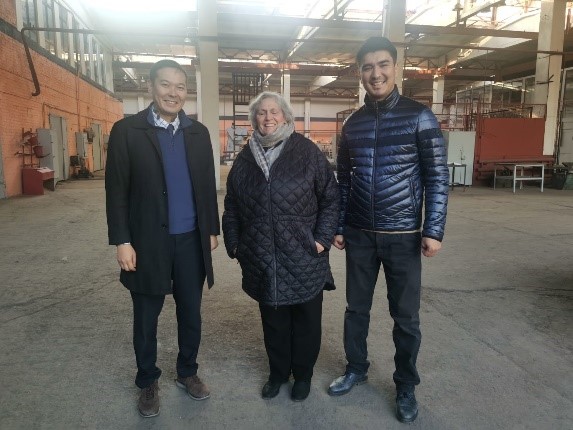Almaty FabLab
Meeting with Sherry Lassiter at our plant
Director of the Fab Lab Outreach Program at the Bits and Atoms Center at MIT. President and CEO of the Fab Foundation.

Sherry Lassiter is one of the key architects of MIT’s global initiative to foster local technology, the Fab Lab program. Fab Lab, or as its users often call it, the “fabulous lab,” is a platform for rapid prototyping, technical education, innovation, and self-expression. Today, the Fab Lab network includes more than 1,800 digital fabrication labs in more than 100 countries.
Lassiter is president and CEO of the Fab Foundation, a nonprofit organization dedicated to developing local technical capacity, increasing people’s ability to develop themselves and their communities, and expanding access to the tools and knowledge that support innovative practices.
She works at the intellectual intersection where the transfer of useful and inspiring technical knowledge enables ideas to become reality—where “bits become atoms.” This interdisciplinary space requires a commitment to creating educational tools and exploring intellectual and economic frontiers.
Before joining MIT, Lassiter spent more than two decades in science journalism as a producer, writer, and director for television programs such as Scientific American Frontiers, Discover the World of Science, and The Science Times. Over time, she moved from being a storyteller to a participant in scientific and technological progress. As a program manager at MIT’s NSF-funded Bits & Atoms Center, she witnessed and participated in the growth of the personal fabrication movement.
At MIT, Lassiter became a strong advocate for personal fabrication and believes in the power of making things with your own hands. Creating useful and meaningful objects requires a deep understanding of science, math, and engineering. Her work at the Fab Lab inspired her to return to school to explore how to integrate digital fabrication into the classroom—not only to develop STEM skills, but also to build the integrated knowledge that young people need to invent and innovate. Lassiter holds an M.Ed. from Harvard University and continues to develop intuitive, integrated tools and resources for teaching engineering and science to future engineers, scientists, artists, and makers so they can thrive in a global economy.
She currently spends most of her time managing the MIT program, coordinating the international Fab Lab network on behalf of the Fab Foundation, and engaging in digital fabrication and mentoring of youth whenever possible. Her mission is to expand and grow Fab Labs around the world, with a focus on developing technology from the community, for the community, and with the community.
Overview ‹ Fab Labs — MIT Media Lab

Meeting with FIB Lab, Tsinghua University. FIB Lab is a part of Tsinghua University. Future Intelligence Lab (FIB) is dedicated to studying and finding solutions to complex global problems of cities and urbanization, which require big data, knowledge analytics, visualization and optimization, and the interdisciplinary application of artificial intelligence in the context of urban planning and policy making. Our mission is to contribute to the development of future cities through scientific theoretical foundations and cutting-edge technologies realized through high-impact research and large-scale implementation. In our work, we use a variety of interdisciplinary methods, including Data-centric Studies, AI-centric Studies, and User-centric Studies.